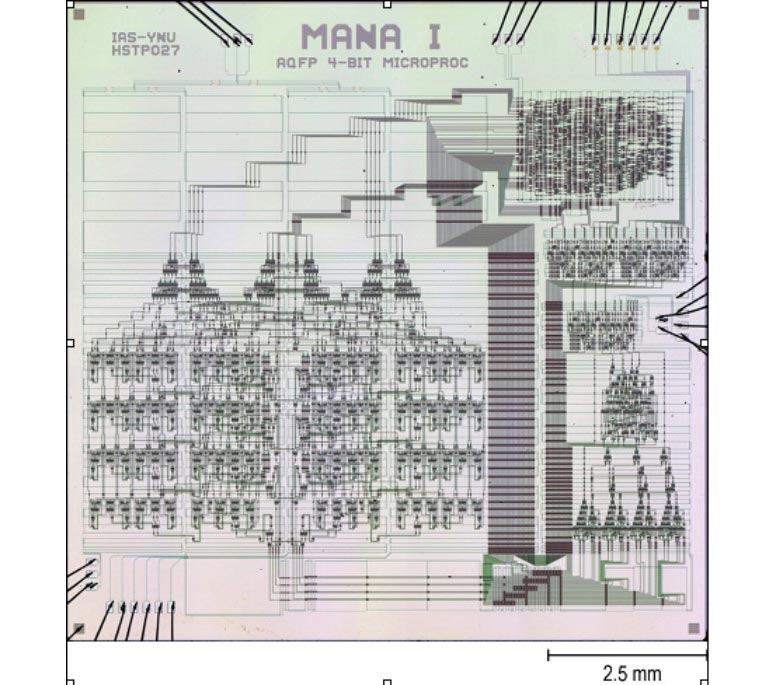
AQFP MANA microprocessor die photo. MANA is the world’s first adiabatic superconductor microprocessor. Credit: Yokohama National University
Researchers from Yokohama National University in Japan have developed a prototype microprocessor using superconductor devices that are about 80 times more energy efficient than the state-of-the-art semiconductor devices found in the microprocessors of today’s high-performance computing systems.
As today’s technologies become more and more integrated in our daily lives, the need for more computational power is ever increasing. Because of this increase, the energy use of that increasing computational power is growing immensely. For example, so much energy is used by modern day data centers that some are built near rivers so that the flowing water can be used to cool the machinery.
“The digital communications infrastructure that supports the Information Age that we live in today currently uses approximately 10% of the global electricity. Studies suggest that in the worst case scenario, if there is no fundamental change in the underlying technology of our communications infrastructure such as the computing hardware in large data centers or the electronics that drive the communication networks, we may see its electricity usage rise to over 50% of the global electricity by 2030,” says Christopher Ayala, an associate professor at Yokohama National University, and lead author of the study.
The team’s research, published in Journal: IEEE Journal of Solid-State Circuits, details an effort to develop a more energy efficient microprocessor architecture using superconductors, devices that are incredibly efficient, but require certain environmental conditions to operate.
To tackle this power problem, the team explored the use of an extremely energy-efficient superconductor digital electronic structure, called the adiabatic quantum-flux-parametron (AQFP), as a building block for ultra-low-power, high-performance microprocessors, and other computing hardware for the next generation of data centers and communication networks.
“In this paper, we wanted to prove that the AQFP is capable of practical energy-efficient high-speed computing, and we did this by developing and successfully demonstrating a prototype 4-bit AQFP microprocessor called MANA (Monolithic Adiabatic iNtegration Architecture), the world’s first adiabatic superconductor microprocessor,” said Ayala.
“The demonstration of our prototype microprocessor shows that the AQFP is capable of all aspects of computing, namely: data processing and data storage. We also show on a separate chip that the data processing part of the microprocessor can operate up to a clock frequency of 2.5 GHz making this on par with today’s computing technologies. We even expect this to increase to 5-10 GHz as we make improvements in our design methodology and our experimental setup,” Ayala said.
However, superconductors require extremely cool temperatures to operate successfully. One would think that if you factor in the cooling required for a superconductor microprocessor, the energy requirement would become undesirable and surpass current day microprocessors. But according to the research team this, surprisingly, was not the case:
“The AQFP is a superconductor electronic device, which means that we need additional power to cool our chips from room temperature down to 4.2 Kelvin to allow the AQFPs to go into the superconducting state. But even when taking this cooling overhead into account, the AQFP is still about 80 times more energy-efficient when compared to the state-of-the-art semiconductor electronic devices found in high-performance computer chips available today.”
Now that the team has proven the concept of this superconductor chip architecture, they plan to optimize the chip and determine the chip’s scalability and speed post optimization.
“We are now working towards making improvements in the technology, including the development of more compact AQFP devices, increasing the operation speed, and increasing the energy-efficiency even further through reversible computation,” Ayala said. “We are also scaling our design approach so that we can fit as many devices as possible in a single chip and operate all of them reliably at high clock frequencies.”
In addition to building standard microprocessors, the team is also interested in examining how AQFPs could assist in other computing applications such as neuromorphic computing hardware for artificial intelligence as well as quantum computing applications.
Reference: “MANA: A Monolithic Adiabatic iNtegration Architecture Microprocessor Using 1.4-zJ/op Unshunted Superconductor Josephson Junction Devices” by Christopher L. Ayala; Tomoyuki Tanaka; Ro Saito; Mai Nozoe; Naoki Takeuchi and Nobuyuki Yoshikawa, 15 December 2020, IEEE Journal of Solid-State Circuits.DOI: 10.1109/JSSC.2020.3041338